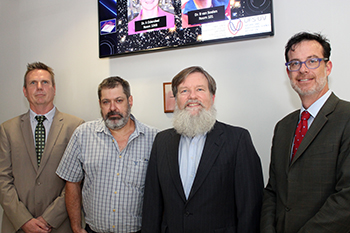Latest News Archive
Please select Category, Year, and then Month to display items
22 July 2019
|
Story Cody Rogers

The 2019 Student Affairs Week Survey (SAWS) is a short questionnaire which aims to gauge your experience of Student Affairs on several levels.
This includes your awareness and perceived relevance of various Student Affairs divisions as well as your participation in the programmes offered by Student Affairs. We would also like your input on preferred communication platforms, co-curricular programmes and safety and security on campus.
Furthermore, we value your feedback and trust that you will provide us with some comments and recommendations.
Let your voice be heard- complete the 2019 Student Affairs Week Survey:
http://surveys.ufs.ac.za/evasys/online.php?p=SM78H- Bloemfontein Campus
http://surveys.ufs.ac.za/evasys/online.php?p=1TSR5 – South Campus
http://surveys.ufs.ac.za/evasys/online.php?p=QDJGG – Qwaqwa Campus
Accessible online from the 22 July - 2 August.
NASA Deep Space Navigation engineer presents at Naval Hill Planetarium
2017-03-30

From the left: Chris du Plessis; US Consulate, Johannesburg,
Prof Petrus Meintjes; Dept of Physics UFS, Christopher Jacobs;
NASA, and Anthony Deaton; US Consulate Johannesburg.
Photo: Rulanzen Martin
The University of the Free State (UFS) hosted NASA Deep Space engineer Christopher Jacobs on 27 March 2017 at the Bloemfontein Campus. The engagement was hosted by Prof Matie Hoffman of the Department of Physics and the Department of Institutional Advancement, in collaboration with the US Consulate General in Johannesburg.
Jacobs is stationed at NASA’s Jet Propulsion Laboratory (JPL) at the California Institute of Technology and has served as the Reference Frame Calibration task manager for 25 years. In this role he has been responsible for delivering the reference frames used to navigate NASA missions such as the Mars Science Laboratory to planetary targets.
His visit to the UFS included a presentation to the Department of Astrophysics at the Faculty of Natural and Agricultural Sciences and at the Naval Hill Planetarium in Bloemfontein where he spoke on Stellar GPS: Navigating the Solar System. He also spoke about the latest research and developments at NASA in Astrometry. The visit will establish and develop shared interests and possible collaboration with UFS and other institutions of interest in the country. “South Africa, because of its well-placed geographic location in the southern hemisphere, holds a lot of answers to astronomy,” Jacobs said.
He has an active interest in professional and public education, and outreach, having given public lectures around the world. “Astronomy brings people together and is a point of common interest that is key in solving environmental and geographical challenges such as climate change, therefore global cooperation is important,” he said.
Prof Hoffman welcomed the initiative by the US Consulate and the possible outcomes of joint efforts to position the UFS as a key partner in South Africa on NASA’s astronomy projects. In the coming weeks Jacobs will speak at high schools in Gauteng including the Mae Jemison US Science Reading Room in Mamelodi, Pretoria, a centre that is focused on promoting science education.